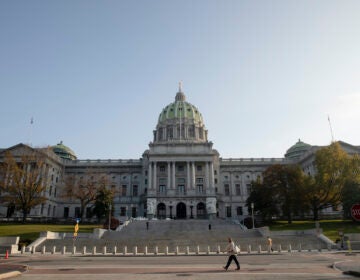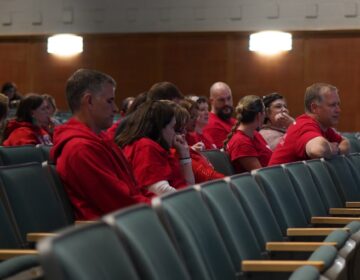Pennsylvania education administrators sound alarm over state budget impasse that froze millions for schools, teachers
Now more than 100 days late, the lack of a budget means the loss of millions of dollars for individual districts as they borrow to “keep the lights on.”

The hallway of a school in Pennsylvania. (Nate Smallwood for Spotlight PA)
From Philly and the Pa. suburbs to South Jersey and Delaware, what would you like WHYY News to cover? Let us know!
As Pennsylvania’s budget stalemate sails past its 100th day, public education leaders from across the state gathered for a virtual press conference to issue a stark warning: Schools are running out of time, money and options.
Representatives from eight education organizations and school districts around the state detailed how the prolonged budget impasse is crippling operations. They called on lawmakers to immediately pass a complete and responsible state budget.
“The consequences are no longer looming. They are here,” said Brad Whitman, executive director of the Northwest Tri-County Intermediate Unit 5, which provides programs and services for 17 public school districts in northwestern Pennsylvania.
“We’re borrowing money just to stay afloat. Every day without a budget means fewer resources for real children,” he added.
Whitman emphasized that his agency supports some of Pennsylvania’s most vulnerable children, including “children with disabilities, early learners — ages 3 and 4 — students facing behavioral health challenges and those in need of specialized services.”
But instead of focusing on instruction, “we’re spending too much time navigating cash flow crises,” he said.
At the heart of the crisis is more than $3 billion in state education funding that is frozen in state accounts. It’s led to schools scrambling to cover payroll costs and having to delay purchases while suspending what they say are critical programs.
Many districts are also unable to access federal funds that were allocated before the federal government shutdown in Washington, D.C., and that are now contingent on the passage of a state budget.
“This is a crisis, a crisis that is directly affecting our ability to serve our students,” said Sabrina Backer, school director at Franklin Area School District and president-elect of the Pennsylvania School Boards Association. “School districts across Pennsylvania are being forced to make difficult decisions, hiring freezes, delaying contracts and we’re cutting nonessential spending just to keep our lights on and our classrooms open for our students.”
Budget gridlock and fallout
Pennsylvania has been operating without an approved budget since the fiscal year began July 1, a stalemate stemming from partisan divisions over revenue sources, public transportation and spending priorities, including on education.
The impasse is not unprecedented: Pennsylvania has a long history of budget delays. But this year’s gridlock comes with added structural pressures, including inflation, rising operational school costs and the shrinking ability of local districts to absorb shortfalls.
While much of the state government remains open and services continue, payments to local governments and vendors have been blocked. That means critical line items — including those for education, social services and human services — are delayed as counties and schools that depend heavily on state aid are watching their revenue streams disappear, despite the fact that the school year is now well underway. In Chester County, for example, human services payments totaling millions were frozen.
Head Start programs, nonprofits and community‑based organizations began feeling the squeeze as early as the summer. The nonprofit Jefferson‑Clarion Head Start program laid off staff and is maxing out a $750,000 line of credit, jeopardizing services for more than 300 enrolled families. Smaller social service providers, including rape crisis centers and domestic violence programs, have cut staff or reduced services. Some counties are borrowing to maintain essential safety net programs — a cost that ultimately may fall on local taxpayers.
The impasse compounds a longer‑term challenge: Pennsylvania’s system of school funding has been ruled unconstitutional by the Commonwealth Court. In a 2023 decision, the court found that the state’s education funding formula disproportionately harmed low‑wealth school districts and lacked a rational basis under the state constitution.
In response, Gov. Josh Shapiro proposed directing $526 million toward “adequacy funding” in his 2025-2026 budget — part of a broader push to close a court‑mandated gap that state calculations place at $4.5 billion. But with no budget passed, that proposed funding — and other line items in the governor’s plan— are now in limbo.
‘Doing our part’
As a result, individual school districts are out millions of dollars.
“All of our burden is placed on the local school district,” said John Augustine, director of the Greater Johnstown Career and Technology Center. He added that technical and vocational education centers like his face a particular peril since they lack taxing power and cannot borrow for operating expenses.
“Both Republicans and Democrats have long supported career and technical education as a cornerstone for Pennsylvania’s economy,” he said. “Now is the time to demonstrate bipartisan leadership, to provide safeguards for our students, our taxpayers and for the commonwealth’s future workforce.”
Robert Kartychak, principal of Hopewell High School in Beaver County, said his district has received $1 million from property tax reduction funds, but that’s only a fraction of the funding it has expected.
“We’re still waiting on $23 million,” he said, adding capital projects and technological upgrades have been deferred and open instructional positions remain unfilled.
In Hollidaysburg, Mike Rawlins, a teacher in the local district, said they are owed nearly $4.9 million.
“This is just unacceptable,” he said. “We’re already feeling the effects of the grants cut for facilities improvement as we have decades old buildings — including our junior high school, which was built in the early 1900s — that are just decaying rapidly. This affects all of our students, all of my students in the classroom every day.”
In Norristown, Superintendent Christopher Dormer said his district is still owed “more than $43 million in new state funding. Those dollars remain out of reach to us here in Norristown.”
That delay has forced the district to defer capital projects, postpone technology upgrades and leave key positions unfilled.
“Our schools are open. Teachers are teaching. Buses are running. Meals are being served. Students are learning,” he said. “We are doing our part. Now we need to partner with our state leaders to help them do their job … This isn’t about politics or process. It’s about Pennsylvania, our children and the right of those children to receive a fully funded and fairly funded public education.”

Get daily updates from WHYY News!
WHYY is your source for fact-based, in-depth journalism and information. As a nonprofit organization, we rely on financial support from readers like you. Please give today.







